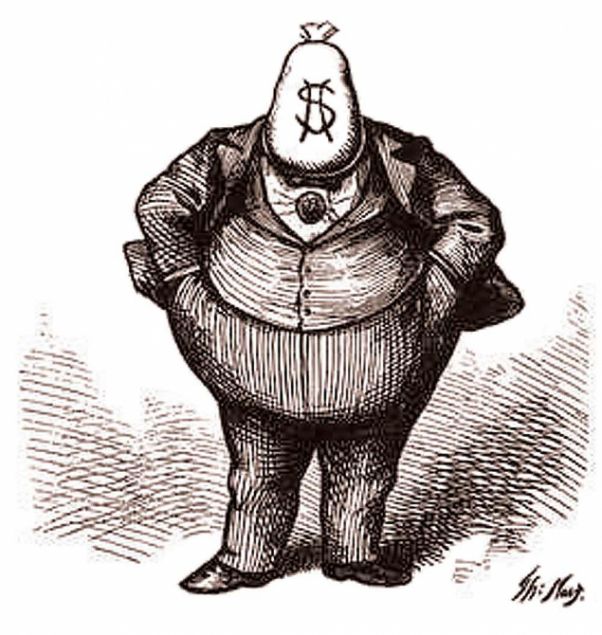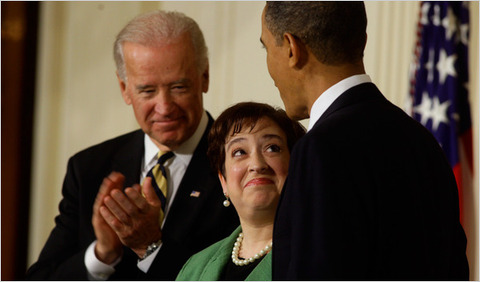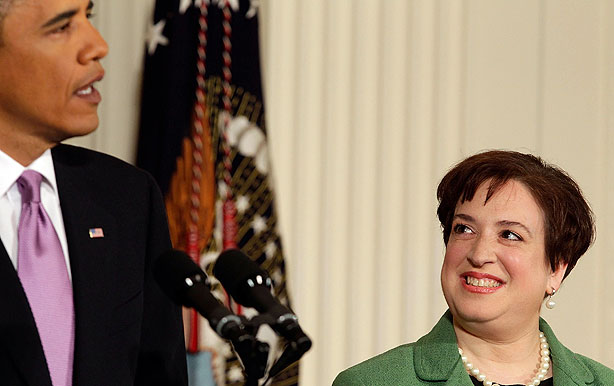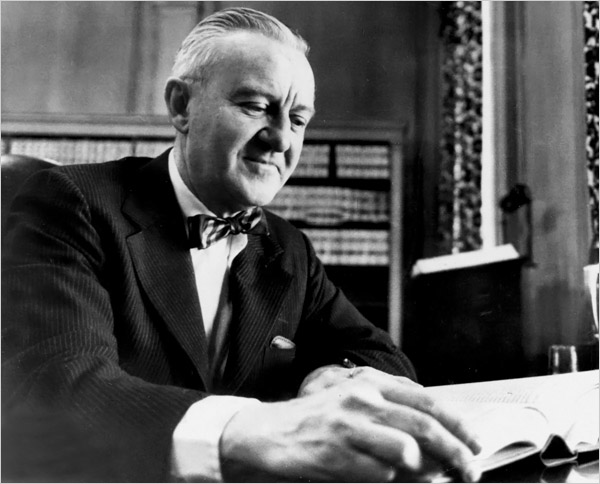“Debate on the question of money and politics has been percolating within the ACLU for years, long before the Supreme Court handed down its decision in Citizens United. ‘It is difficult to think of an issue that has generated more internal controversy,’ an internal ACLU memo states.“
To its credit and as a result of the Citizens United decision (which the organization has previously lawyered and lobbied for), the ACLU convenes a weekend summit to discuss its campaign finance reform position. “‘The ACLU’s version of democracy is from the ground-up,’ one civil rights lawyer, David Gans, told the ACLU’s board, which was assembled downtown at One New York Plaza. ‘Now Exxon Mobil can spend 2% of its money and blow that all up.’“
Here’s hoping the reformers win the day — or walk out CIO-style if they don’t. Imho, the stance that unlimited corporate funding of our elections is a right guaranteed by the First Amendment has always been the Achilles’ heel of an otherwise superb organization. I’m not a lawyer, but as far as I can tell, their reasoning relies on two unfortunate bugs in the legal code — corporate personhood and the conflation of money with speech — that they too often deem fundamental First Amendment principles. I would argue they’re not.
For why the former — corporate personhood — has obvious problems, just read Justice Stevens’ dissent from Thursday:
“The basic premise underlying the Court’s ruling is its iteration, and constant reiteration, of the proposition that the First Amendment bars regulatory distinctions based on a speaker’s identity, including its ‘identity; as a corporation. While that glittering generality has rhetorical appeal, it is not a correct statement of the law….
Although they make enormous contributions to our society, corporations are not actually members of it. They cannot vote or run for office. Because they may be managed and controlled by nonresidents, their interests may conflict in fundamental respects with the interests of eligible voters. The financial resources, legal structure,and instrumental orientation of corporations raise legitimate concerns about their role in the electoral process. Our lawmakers have a compelling constitutional basis, if not also a democratic duty, to take measures designed to guard against the potentially deleterious effects of corporate spending in local and national races.”
For the latter — the ruinous conflation of money and speech in Buckley v. Valeo — check out Stevens’ concurrence in Nixon v. Shrink Government Pact (2000), where he says how he’d come down if Buckley were reopened:
“In response to [Justice Kennedy’s] call for a new beginning, therefore, I make one simple point. Money is property; it is not speech.
Speech has the power to inspire volunteers to perform a multitude of tasks on a campaign trail, on a battleground, or even on a football field. Money, meanwhile, has the power to pay hired laborers to perform the same tasks. It does not follow, however, that the First Amendment provides the same measure of protection to the use of money to accomplish such goals as it provides to the use of ideas to achieve the same results…
Telling a grandmother that she may not use her own property to provide shelter to a grandchild — or to hire mercenaries to work in that grandchild’s campaign for public office — raises important constitutional concerns that are unrelated to the First Amendment.”
(See also Byron White’s concurrence in part in Buckley, which argues that “[n]othing in the First Amendment stands in the way of ” campaign finance limits.)
But somewhere along the line and for whatever reason, the ACLU latched on to both of these unwise shibboleths, and have since been arguing that corporate personhood and the idea of money as speech are both enshrined in the First Amendment. Uh…really?
To see what kind of damage these two bogus ideas have wrought, one need only to go over to Salon and read through Glenn Greenwald’s ugly meltdown on Citzens United the past few days. As anyone who visits GitM regularly knows, I link to Greenwald pretty much constantly. On a host of issues, from Obama’s terrible record on civil liberties to the broken-down state of our journalism, he’s been remarkably on point, and one of my favorite columnists to read. I used to wonder if there was anything I disagreed with him on. Well, it turns out, there is. And, apparently, I’m a “partisan hack” for thinking different.
For the Cliff Notes version of this whole conversation, I wrote up a snarky summation of it here yesterday, well after things had gone south. But, basically, Glenn — on “homework assignment” — argued on Friday that, all the negative consequences that will ensue aside, the Majority in Citizen’s United decided the case correctly, that this was a victory for the first amendment, and that people who disagree with their decision are practicing “outcome-based law.” (He also made the dubious and unprovable assertion that things can’t get any worse anyway. Really? We’ll see.)
Well, this assessment did not sit right with a lot of people. Some questioned his reading of the case. Others pointed out that law is always outcome-based, even the Majority’s ruling in Citizens. (The concerned outcome for Justice Kennedy here is that blogs might get banned someday, somehow, if this ruling isn’t made. I’ll take my chances.) And, others, such as myself, questioned these two principles — corporations are people, money is speech — that the ruling was based on.
Well, suffice to say, Greenwald did not take criticism well. He adamantly refused to engage either notion — money isn’t speech, corporations aren’t people — as having any merit whatsoever, eventually trying to write off both with some dubious 1L hypotheticals. (All were answered to his disadvantage, several times over.) He went on to ridicule the folks who disagreed with him in a “check out the Big Brain on me” kinda way. (He argued his lawyerly creds just means he knows better.) He ignored Stevens’ actual dissent throughout. And he accused folks of being just like Dubya on torture for deigning to disagree with him on the decision.
This embarrassing conceit — those with disagree with me are Dubyaites, end of story — formed the extraordinarily condescending introduction of Greenwald’s follow-up to his first post. Still ignoring the legitimate criticisms people were making of the two assertions above — money=speech and corporations=people, Glenn instead pulled one line from Justice Stevens’ ninety pages of dissent to argue that all nine Justices agreed with both of these propositions. (This even though both Ginsburg and Sotomayor questioned the corporate personhood idea in oral arguments, and that Stevens explicitly said he did not agree with the money=speech proposition in Nixon v. Shrink, an argument Glenn would not touch.) As it turns out, the one line Glenn pulled from Stevens’ dissent proved neither assertion. Nonetheless, he returned to his shell, refusing to even consider the notion that “money=speech” or “corporations=people” might be lousy interpretations or legal accidents, or that they aren’t necessarily covered by the First Amendment.
When I shared the above ACLU story this morning, Greenwald blew another gasket:
“The ACLU has a long history of standing up to and defying people [like] you: those who pretend to believe in the Constitution and civil liberties only when it can be used as a weapon to advance your partisan and political agenda.
If they didn’t reverse themselves on the First Amendment rights of Nazis in the wake of huge numbers of people like you (those who only believe in the Constitution when it suits them) cutting off funding and leaving the organization, I highly doubt they will do so now….
But what has made the ACLU such an important and unique organization is that they have stood their ground on principle and resisted the efforts of people like you to turn it into a partisan tool rather than an organization devoted to the Constitution.”
I guess he figured I’d forget what “people like me” means from paragraph to paragraph. And, yes, y’all, I’ve been writing on politics and progressivism here for ten years because I’ve always wanted to subvert the Constitution to my own ends. And I would’ve gotten away with it too, if it weren’t for that nasty Greenwald!
Anyway, when I then reminded Greenwald that people of principle can disagree on these issues, and that it may even be possible that the ACLU reformers might even be the right ones in this story, that’s when I got called an Orwellian partisan hack once more. (FWIW, here’s my kissoff. I particularly like “paddock of principle and certitude.”)
Throughout this whole back-and-forth, there was not even the remotest possibility that any other interpretation on these two questions had merit for Greenwald: Corporations have first amendment rights. Money is speech. Both are obviously enshrined in the First Amendment. And arguing anything else is ridiculous and deserving of scorn (even if Supreme Court justices have argued differently in the past, including as recently as Thursday.) So let it be written, so let it be done.
Uh…really? Who knows…perhaps it’s a lawyer thing. Nonetheless, this myopic, bullish way of thinking — I hold the only correct possible interpretation of the law, and you’re either with me or you’re with the Dubyaites — isn’t very satisfying on either personal or argumentative grounds. And Greenwald’s constant doubling down on his original argument, even as more and more holes were poked in it by various responders, makes me question not only his temperament but his writing in general. He usually provides a valuable public service, no doubt, but he seems to have bought into his own hype as an Incorruptible Defender of Liberty. If you can’t think outside of yourself once in awhile, or find some way to weigh arguments you may not necessarily agree with without deeming them unprincipled, you’re really not much use to anyone.
Update: Looks like Greenwald addressed this topic one more time this morning. Here’s what he said:
“‘Money is not speech’ is an idiot bumper sticker slogan, not a meaningful argument which resolves anything. ‘Corporations have no constitutional rights’ is such an extreme and dangerous position (it endorses the constitutionality of the FBI’s searching whatever corporate offices they want and seizing all corporate documents with no search warrants or probable cause, or the Congress’ imposing $10 million fines on corporations every time they criticize the government, among other things) that it’s frivolous in the extreme. Despite that, I spent substantial time all weekend addressing and responding to those frivolous bumper sticker slogans.“
So there you have it. An “idiot bumper sticker slogan”…repeated verbatim by Justice Stevens in 2000. (And, for what it’s worth, Greenwald referred to civil rights lawyer David Kairys’ piece on these two questions, linked several times above, as “stupid and ill-informed.”) Class act, Glenn.






